Unit 2 My Favourite School Subject-Lesson 8 课件(共45张PPT)
文档属性
| 名称 | Unit 2 My Favourite School Subject-Lesson 8 课件(共45张PPT) | 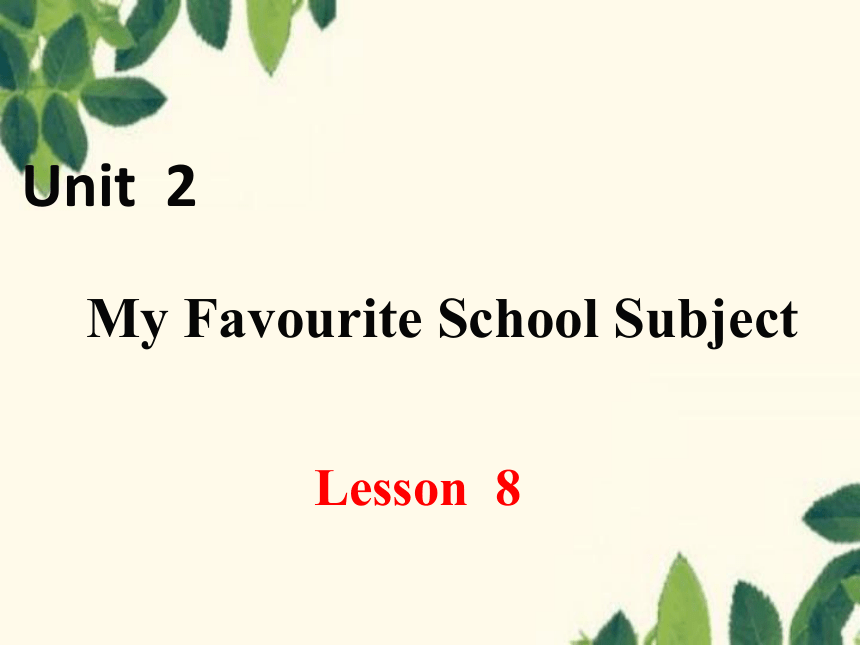 | |
| 格式 | ppt | ||
| 文件大小 | 4.2MB | ||
| 资源类型 | 教案 | ||
| 版本资源 | 冀教版 | ||
| 科目 | 英语 | ||
| 更新时间 | 2022-07-19 10:43:41 | ||
图片预览

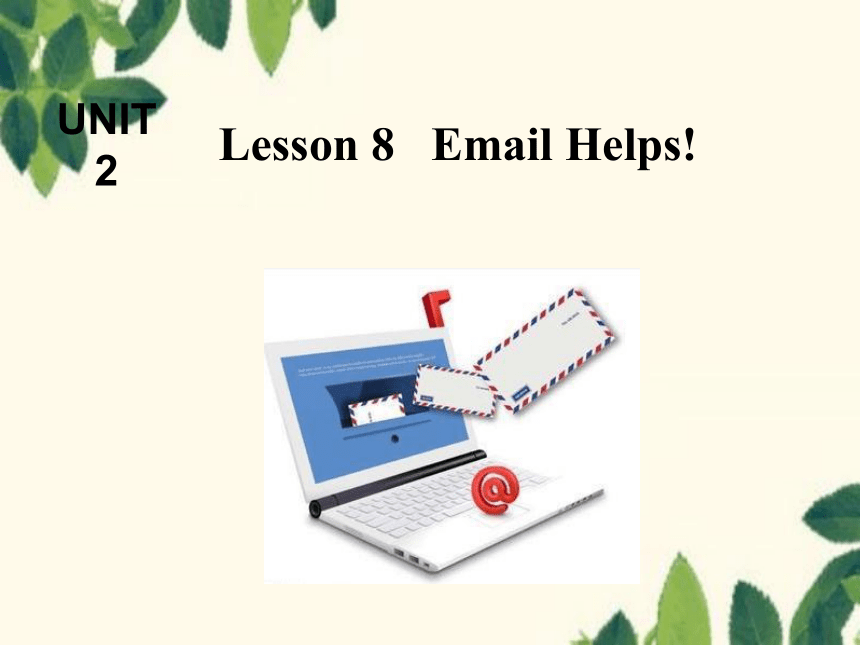
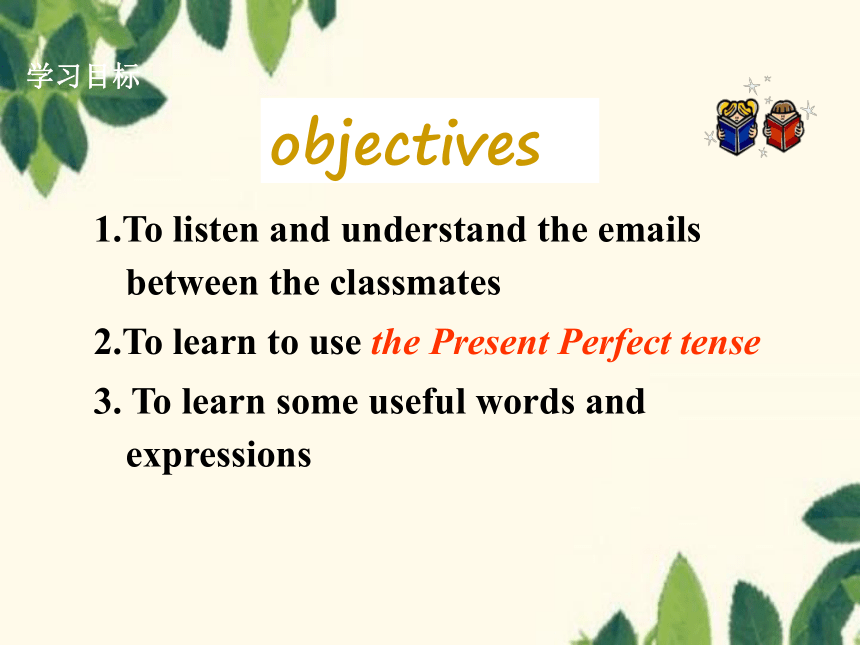
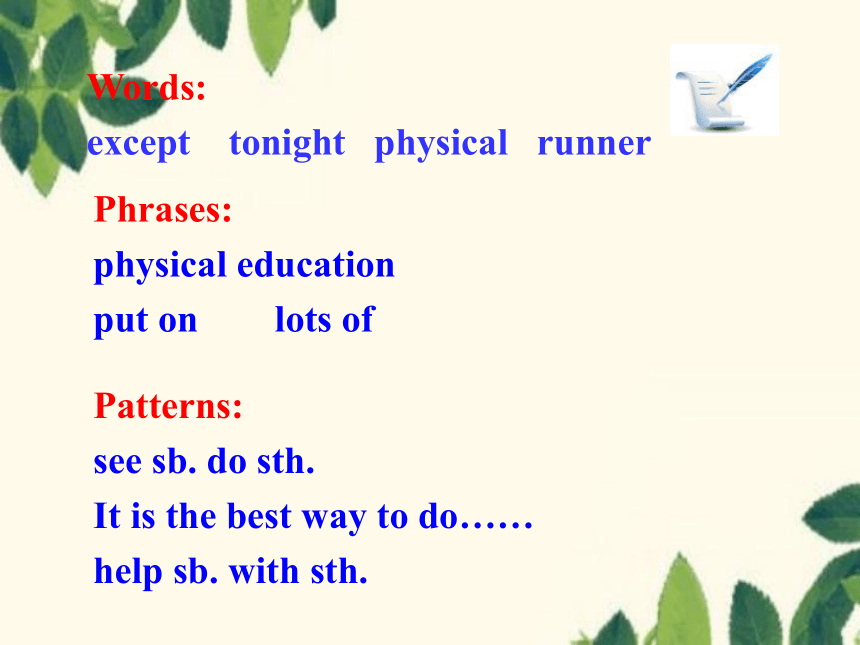
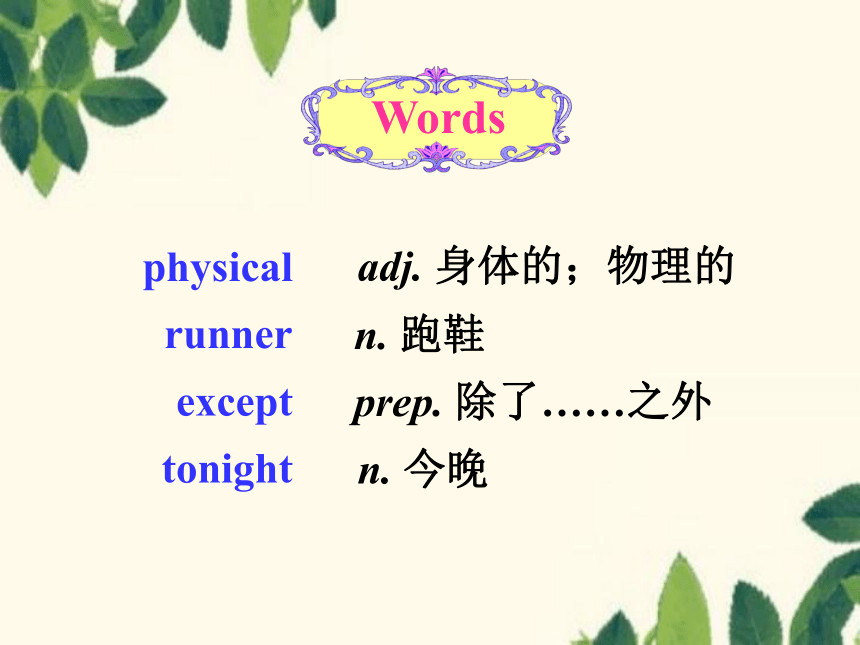
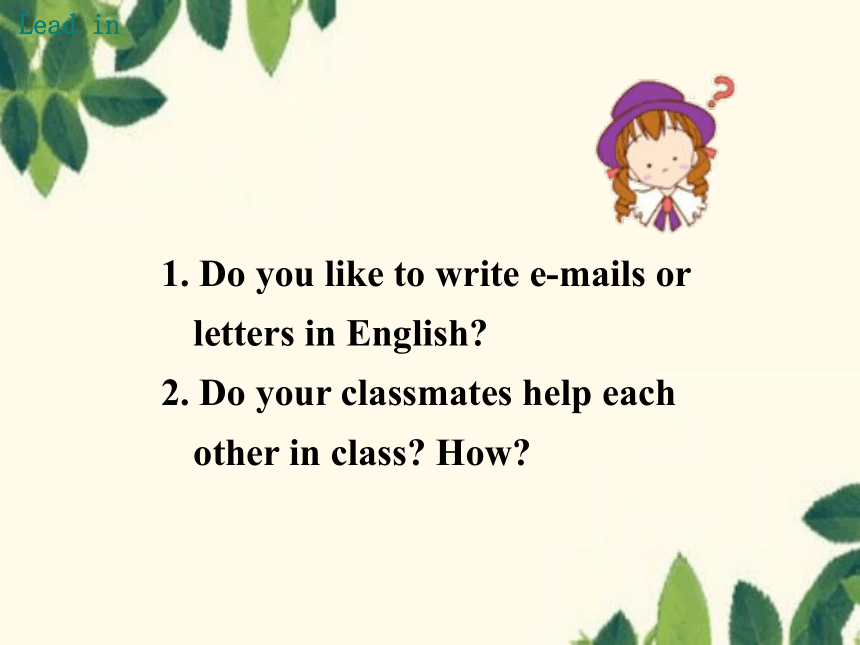
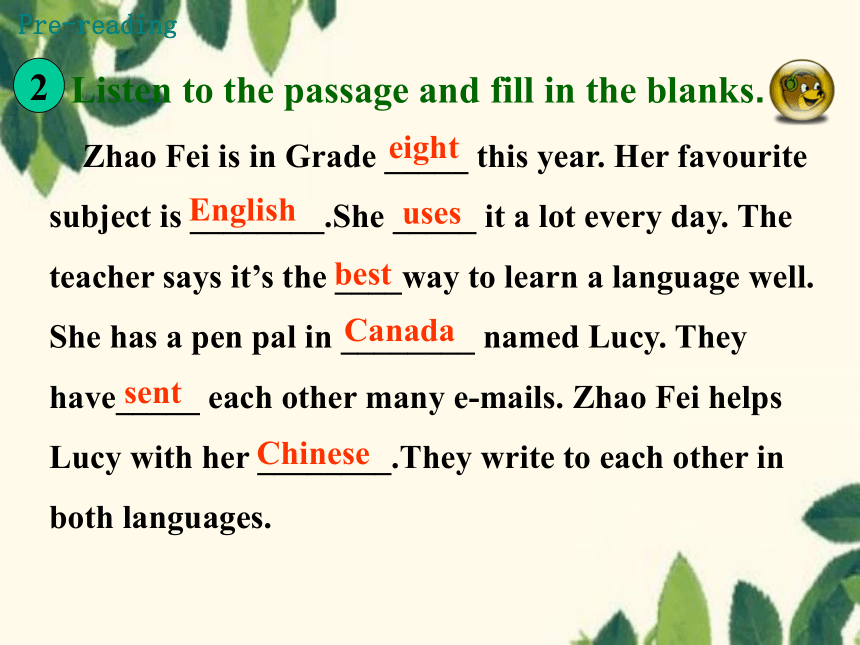

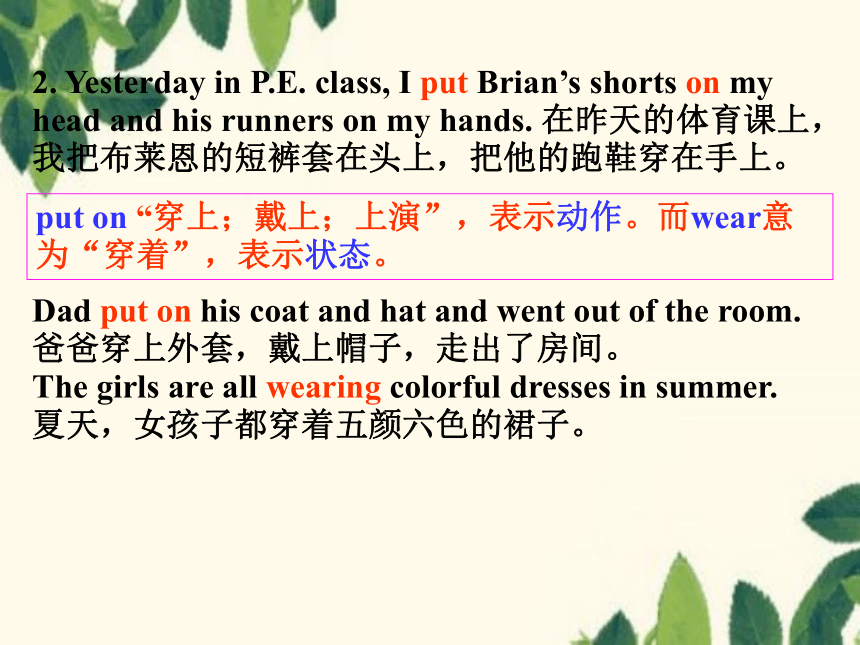
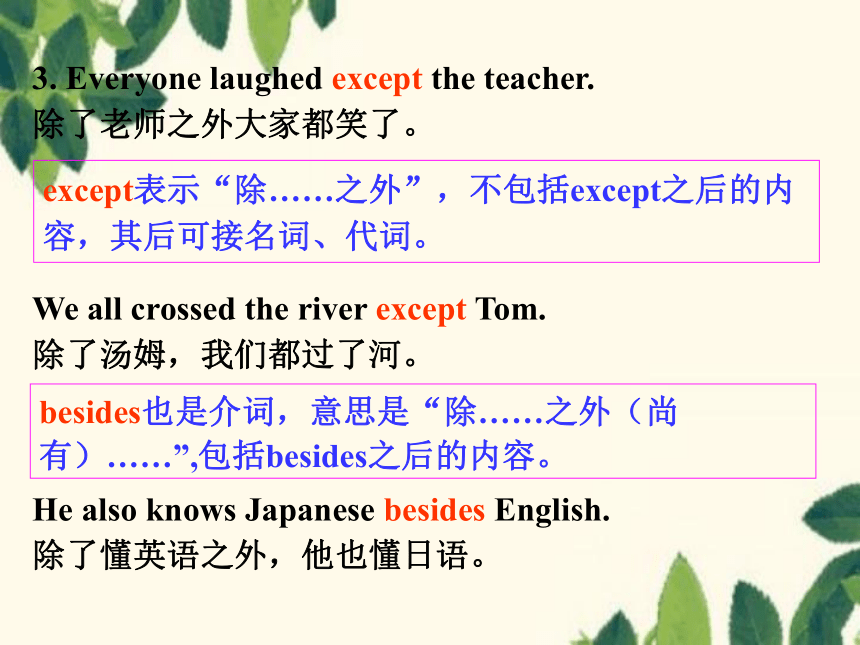
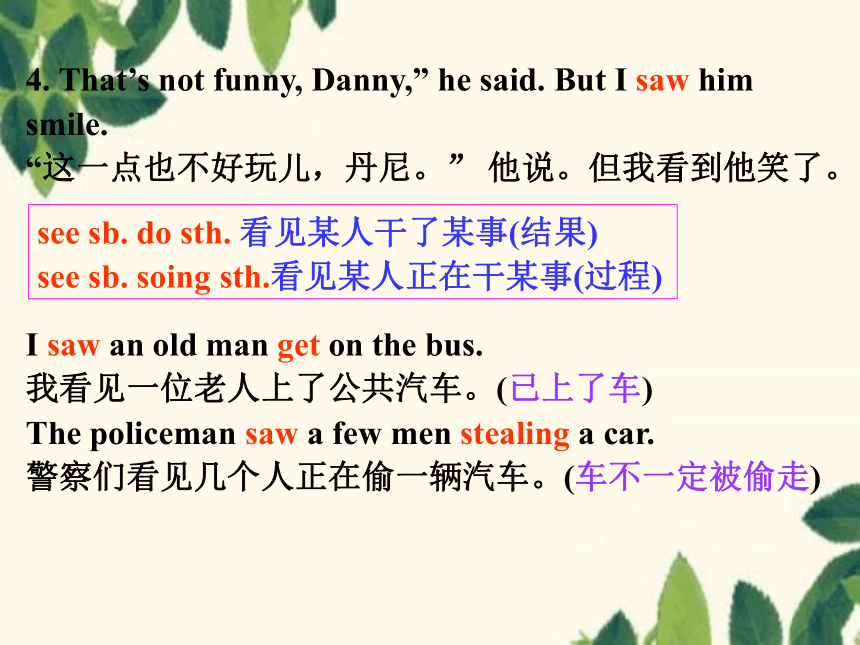
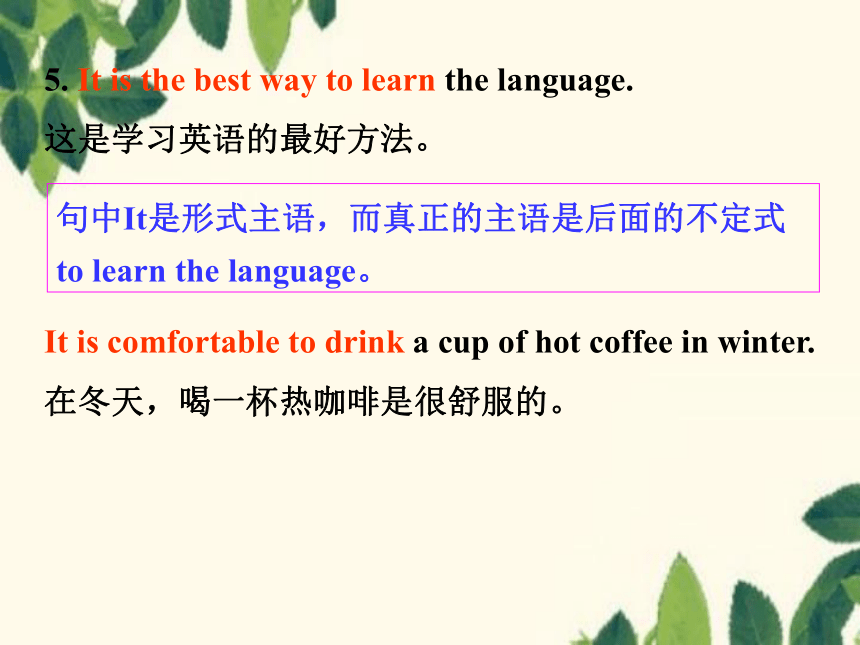
文档简介
(共45张PPT)
Lesson 8
My Favourite School Subject
Unit 2
UNIT
2
Lesson 8 Email Helps!
学习目标
objectives
1.To listen and understand the emails between the classmates
2.To learn to use the Present Perfect tense
3. To learn some useful words and expressions
Words:
except tonight physical runner
Phrases:
physical education
put on lots of
Patterns:
see sb. do sth.
It is the best way to do……
help sb. with sth.
adj. 身体的;物理的
Words
physical
runner
except
tonight
n. 跑鞋
prep. 除了……之外
n. 今晚
1. Do you like to write e-mails or letters in English
2. Do your classmates help each other in class How
Lead in
Listen to the passage and fill in the blanks.
Zhao Fei is in Grade _____ this year. Her favourite subject is ________.She _____ it a lot every day. The teacher says it’s the ____way to learn a language well. She has a pen pal in ________ named Lucy. They have_____ each other many e-mails. Zhao Fei helps Lucy with her ________.They write to each other in both languages.
eight
English
uses
best
Canada
sent
Chinese
2
Pre-reading
1. All of our teachers make us study very, very hard.
我们所有的老师都让我们非常非常努力地学习。
The boy made his dog stand with two legs.
这个男孩让他的狗用两条腿站着。
make, let和have是三个使役动词,意为“使,让”,当其加复合宾语时,若宾语补足语为不定式时省略不定式符号to,即make sb./ sth. do。
Language Points
While-reading
2. Yesterday in P.E. class, I put Brian’s shorts on my head and his runners on my hands. 在昨天的体育课上,我把布莱恩的短裤套在头上,把他的跑鞋穿在手上。
Dad put on his coat and hat and went out of the room.
爸爸穿上外套,戴上帽子,走出了房间。
The girls are all wearing colorful dresses in summer.
夏天,女孩子都穿着五颜六色的裙子。
put on “穿上;戴上;上演”,表示动作。而wear意为“穿着”,表示状态。
3. Everyone laughed except the teacher.
除了老师之外大家都笑了。
We all crossed the river except Tom.
除了汤姆,我们都过了河。
He also knows Japanese besides English.
除了懂英语之外,他也懂日语。
except表示“除……之外”,不包括except之后的内容,其后可接名词、代词。
besides也是介词,意思是“除……之外(尚有)……”,包括besides之后的内容。
4. That’s not funny, Danny,” he said. But I saw him smile.
“这一点也不好玩儿,丹尼。” 他说。但我看到他笑了。
I saw an old man get on the bus.
我看见一位老人上了公共汽车。(已上了车)
The policeman saw a few men stealing a car.
警察们看见几个人正在偷一辆汽车。(车不一定被偷走)
see sb. do sth. 看见某人干了某事(结果)
see sb. soing sth.看见某人正在干某事(过程)
5. It is the best way to learn the language.
这是学习英语的最好方法。
It is comfortable to drink a cup of hot coffee in winter.
在冬天,喝一杯热咖啡是很舒服的。
句中It是形式主语,而真正的主语是后面的不定式to learn the language。
6. Ms. Liu gives us lots of interesting projects in English class.
在英语课上,刘老师给我们很多有趣的课题。
There are lots of beautiful places in the west in this country.
在这个国家西部有很多美丽的地方。
lots of也可以用a lot of,意为“许多,大量”,后面可以跟可数名词也可以跟不可数名词。
7. She has helped me with my maths homework a lot.
她在我的数学作业上给我帮助很多。
We should help small children cross the street.
我们应该帮助小孩子过马路。
Kate often helps her mother with her housework at weekends.
凯特在周末经常帮助她妈妈做家务。
help sb. do sth./ help sb. with sth.
帮助某人做某事
1. Danny’s favourite subject is P.E. ( )
2. The teacher was very angry with
Danny. ( )
3. Li Ming’s favourite subject is English.
( )
4. Li Ming hates maths. ( )
5. Wang Mei has helped Li Ming with
his maths a lot. ( )
T
F
T
F
T
Read the lesson and write true (T) or
false (F).
1
P21
Post-reading
Write the past participles of the verbs below. Then group them.
study tell help write
see know say smile
put laugh play teach
close talk listen walk run make
3
Post-reading
regular verbs
study-studied,
help-helped,
smile-smiled,
laugh-laughed,
play-played,
close-closed,
talk-talked
listen-listened
walk-walked
irregular verbs
tell-told,
write-wrote,
see-saw,
know-knew,
say-said,
put-put,
teach-taught,
run-ran,
make-made
Work in groups and discuss what good methods you use to study your subjects. Then present your ideas to the class.
Example:
English: I like English best. I write e-mails in English every week.
Maths:__________________________
Chinese:_________________________
4
Time for reflection
put on
lots of
see sb. do sth.
help sb. with sth.
It is the best way to do…
穿上
很多
看见某人做某事
帮助某人做某事
这是做......的最好方法
Present Perfect Tense
语法讲解建议采用归纳法,如尽可能多的呈现一些相关例句,或可让学生从已学课文中找相应例句,引导学生试着从所观察到的语言现象中总结出语法规律。
1) Recently, we have learned about the population of the world.
2) Have you ever been abroad, Danny
3) Jenny and I have been to China twice.
4) Have you been to any other countries in Asia
5) Have you visited any other countries
6) He has been to every continent except Antarctica.
7) She has gone to visit her friend.
to test your sense of observation
to test your ability of short-term memory
to test your ability to highlight the language points
Guess
1) Recently, we ____ _______ about the population of the world.
2) ____ ____ ____ ____ abroad, Danny
3) Jenny and I _____ ____ ___ China twice.
4) _____ you ____ to any other countries in Asia
5) _____ you ______ any other countries
6) He ____ _____ ___ every continent except Antarctica.
7) She ____ ____ ____ visit her friend.
Fill in the blanks.
have learned
Have you ever been
Have been
have been to
Have visited
has been to
has gone to
Ready
以上我们已经通过归纳总结和练习对本课的语法内容有了一定的了解,下面就让我们根据之前练习的考察情况进一步选择讲解该语法项的重难点。
构成:1. 肯定句
现在完成时的肯定句式是
“have(has)+过去分词”。
注意:该句式中的have或has是助动词,has用于第三人称单数,其它人称一律用have。
定义:表示过去发生或已经完成的某一动作对现在
造成的影响或结果。
现在完成时
Present Perfect tense
2. 否定句:现在完成时的否定句式是
“haven’t(hasn’t)+过去分词”。
3. 疑问句:现在完成时的一般疑问句式
是把助动词 have或has提到主语之前。
回答用 Yes, …have (has).
/No, …haven’t (hasn’t).
连用时间状语:already, yet, ever,
never, just, before, several times 等。
动词过去分词的变化形式大部分与动词过去式形式相同,但是不规则动词的变化形式没有规律,需要记忆,比如:
see-saw-seen; be-was, were-been
eat-ate-eaten; break-broke-broken
go-went-gone; take-took-taken
send-sent-sent; find-found-found
make-made-made; have-had-had
1. 表示动作到现在为止已经完成或刚刚完成。
I have finished my work.
We have set up many new factories.
2. 动作发生在过去,强调对现在的结果、
影响等。
Have you ever seen the film “Harry Potter”
I’ve spent 3 years in the countryside.
现在完成时--用法
3. 表示动作发生在过去,并且一直持续到现在,甚至还可能继续下去,句中使用持续性动词,且常有表示一段时间的时间状语。
We haven’t seen each other for ten years.
I’ve been an English teacher for about 20 years.
4. 现在完成时可以用在条件或时间状语从句中,表示将来某个时刻之前已经完成的动作。
I’ll go home as soon as I have finished my homework.
Please lend me that book if you have finished reading it.
—Have you finished using my
dictionary
—Yes, I put it back on your desk just
now. Who ____ it away (14湖北十堰)
A. will take B. is taking
C. took D. has taken
2. He _____ in this factory for 20 years already. (14北京)
A. will work B. works
C. has worked D. is working
—What do you think of the new foreign
teacher Thomson
—Pretty good. I think he ____ a great
job so far.
A. does B. did
C. has done D. was done
4. Monica, you ____ the exam!
Congratulation! (14河北)
A. pass B. have passed
C. will pass D. are passing
(14广东)
Team racing
Activity
Two teams have a race. The team first giving the correct sentence gets one point.
Ready
I ____ ever __________________________.
have taken photos of stone animals
ever, take, photos
Stone animals
Has ever been to the Palace Museum by bus
___ Tim ____________________
______________
ever be, by bus
Palace Museum
They ______________________
_________________.
go; by bike
have gone to Hong Kong
Disneyland by bike
Hong Kong Disneyland
The boy ___________________________.
not eat; roast duck
hasn’t eaten Beijing roast duck
Roast duck
Has climbed the Great Wall only once
___ she _____________________________
climb; only once
the Great Wall
My uncle ______________________________.
ride; five times
has ridden the camel for five times
the camel
Practice
Practice
Ⅰ. 从方框中选择正确的介词填空( 每词限用一次)。
in except for to with
I’m not good at maths. My brother often helps me _____it.
2. Time ____ lunch! Let’s go to the
restaurant together.
3. Wendy has written three letters___ her pen pal Tom.
4. We all went to the zoo ______Jenny
because she was sick.
5. Li Ming speaks English well, and he often talks with his friends ___ English.
with
for
to
except
in
Ⅱ. 用括号中所给动词的正确时态填空。
1. My grandfather_____ (tell) us an
interesting story just now.
2. Mr. Smith __________(teach) English in
the school for five years.
3. Listen! Brian ___________(laugh). What
makes him so happy
4. We __________(talk) about the problem
three times this morning. I don’t want to
say anything about it now.
5. Li Mei is kind. She often _____ (help)
others in need.
told
has taught
is laughing
have talked
helps
Ⅲ. 选择填空。
1. Colours can change our feelings. Orange
makes us ____(feel / to feel) happy.
2. I see the boy ____(run / running) on
the playground every morning.
3. Please tell the children _______(stopping /to stop)
making much noise.
4. The best way _________(realizing / to
realize) your dream is to work hard.
5. There are ________(a lot / a lot of) books
in the library. We can learn _____(a lot /a lot of)
from them.
feel
run
to stop
to realize
a lot of
a lot
1. Preview the words and expressions in Lesson 9.
2. Thank You for Your Help: Write a thank-you e-mail to a classmate or a friend who has helped you in school/ class. What subject did they help you with How did they help you Underline all of the regular verbs and circle all of the irregular verbs in your e-mail.
Homework
Lesson 8
My Favourite School Subject
Unit 2
UNIT
2
Lesson 8 Email Helps!
学习目标
objectives
1.To listen and understand the emails between the classmates
2.To learn to use the Present Perfect tense
3. To learn some useful words and expressions
Words:
except tonight physical runner
Phrases:
physical education
put on lots of
Patterns:
see sb. do sth.
It is the best way to do……
help sb. with sth.
adj. 身体的;物理的
Words
physical
runner
except
tonight
n. 跑鞋
prep. 除了……之外
n. 今晚
1. Do you like to write e-mails or letters in English
2. Do your classmates help each other in class How
Lead in
Listen to the passage and fill in the blanks.
Zhao Fei is in Grade _____ this year. Her favourite subject is ________.She _____ it a lot every day. The teacher says it’s the ____way to learn a language well. She has a pen pal in ________ named Lucy. They have_____ each other many e-mails. Zhao Fei helps Lucy with her ________.They write to each other in both languages.
eight
English
uses
best
Canada
sent
Chinese
2
Pre-reading
1. All of our teachers make us study very, very hard.
我们所有的老师都让我们非常非常努力地学习。
The boy made his dog stand with two legs.
这个男孩让他的狗用两条腿站着。
make, let和have是三个使役动词,意为“使,让”,当其加复合宾语时,若宾语补足语为不定式时省略不定式符号to,即make sb./ sth. do。
Language Points
While-reading
2. Yesterday in P.E. class, I put Brian’s shorts on my head and his runners on my hands. 在昨天的体育课上,我把布莱恩的短裤套在头上,把他的跑鞋穿在手上。
Dad put on his coat and hat and went out of the room.
爸爸穿上外套,戴上帽子,走出了房间。
The girls are all wearing colorful dresses in summer.
夏天,女孩子都穿着五颜六色的裙子。
put on “穿上;戴上;上演”,表示动作。而wear意为“穿着”,表示状态。
3. Everyone laughed except the teacher.
除了老师之外大家都笑了。
We all crossed the river except Tom.
除了汤姆,我们都过了河。
He also knows Japanese besides English.
除了懂英语之外,他也懂日语。
except表示“除……之外”,不包括except之后的内容,其后可接名词、代词。
besides也是介词,意思是“除……之外(尚有)……”,包括besides之后的内容。
4. That’s not funny, Danny,” he said. But I saw him smile.
“这一点也不好玩儿,丹尼。” 他说。但我看到他笑了。
I saw an old man get on the bus.
我看见一位老人上了公共汽车。(已上了车)
The policeman saw a few men stealing a car.
警察们看见几个人正在偷一辆汽车。(车不一定被偷走)
see sb. do sth. 看见某人干了某事(结果)
see sb. soing sth.看见某人正在干某事(过程)
5. It is the best way to learn the language.
这是学习英语的最好方法。
It is comfortable to drink a cup of hot coffee in winter.
在冬天,喝一杯热咖啡是很舒服的。
句中It是形式主语,而真正的主语是后面的不定式to learn the language。
6. Ms. Liu gives us lots of interesting projects in English class.
在英语课上,刘老师给我们很多有趣的课题。
There are lots of beautiful places in the west in this country.
在这个国家西部有很多美丽的地方。
lots of也可以用a lot of,意为“许多,大量”,后面可以跟可数名词也可以跟不可数名词。
7. She has helped me with my maths homework a lot.
她在我的数学作业上给我帮助很多。
We should help small children cross the street.
我们应该帮助小孩子过马路。
Kate often helps her mother with her housework at weekends.
凯特在周末经常帮助她妈妈做家务。
help sb. do sth./ help sb. with sth.
帮助某人做某事
1. Danny’s favourite subject is P.E. ( )
2. The teacher was very angry with
Danny. ( )
3. Li Ming’s favourite subject is English.
( )
4. Li Ming hates maths. ( )
5. Wang Mei has helped Li Ming with
his maths a lot. ( )
T
F
T
F
T
Read the lesson and write true (T) or
false (F).
1
P21
Post-reading
Write the past participles of the verbs below. Then group them.
study tell help write
see know say smile
put laugh play teach
close talk listen walk run make
3
Post-reading
regular verbs
study-studied,
help-helped,
smile-smiled,
laugh-laughed,
play-played,
close-closed,
talk-talked
listen-listened
walk-walked
irregular verbs
tell-told,
write-wrote,
see-saw,
know-knew,
say-said,
put-put,
teach-taught,
run-ran,
make-made
Work in groups and discuss what good methods you use to study your subjects. Then present your ideas to the class.
Example:
English: I like English best. I write e-mails in English every week.
Maths:__________________________
Chinese:_________________________
4
Time for reflection
put on
lots of
see sb. do sth.
help sb. with sth.
It is the best way to do…
穿上
很多
看见某人做某事
帮助某人做某事
这是做......的最好方法
Present Perfect Tense
语法讲解建议采用归纳法,如尽可能多的呈现一些相关例句,或可让学生从已学课文中找相应例句,引导学生试着从所观察到的语言现象中总结出语法规律。
1) Recently, we have learned about the population of the world.
2) Have you ever been abroad, Danny
3) Jenny and I have been to China twice.
4) Have you been to any other countries in Asia
5) Have you visited any other countries
6) He has been to every continent except Antarctica.
7) She has gone to visit her friend.
to test your sense of observation
to test your ability of short-term memory
to test your ability to highlight the language points
Guess
1) Recently, we ____ _______ about the population of the world.
2) ____ ____ ____ ____ abroad, Danny
3) Jenny and I _____ ____ ___ China twice.
4) _____ you ____ to any other countries in Asia
5) _____ you ______ any other countries
6) He ____ _____ ___ every continent except Antarctica.
7) She ____ ____ ____ visit her friend.
Fill in the blanks.
have learned
Have you ever been
Have been
have been to
Have visited
has been to
has gone to
Ready
以上我们已经通过归纳总结和练习对本课的语法内容有了一定的了解,下面就让我们根据之前练习的考察情况进一步选择讲解该语法项的重难点。
构成:1. 肯定句
现在完成时的肯定句式是
“have(has)+过去分词”。
注意:该句式中的have或has是助动词,has用于第三人称单数,其它人称一律用have。
定义:表示过去发生或已经完成的某一动作对现在
造成的影响或结果。
现在完成时
Present Perfect tense
2. 否定句:现在完成时的否定句式是
“haven’t(hasn’t)+过去分词”。
3. 疑问句:现在完成时的一般疑问句式
是把助动词 have或has提到主语之前。
回答用 Yes, …have (has).
/No, …haven’t (hasn’t).
连用时间状语:already, yet, ever,
never, just, before, several times 等。
动词过去分词的变化形式大部分与动词过去式形式相同,但是不规则动词的变化形式没有规律,需要记忆,比如:
see-saw-seen; be-was, were-been
eat-ate-eaten; break-broke-broken
go-went-gone; take-took-taken
send-sent-sent; find-found-found
make-made-made; have-had-had
1. 表示动作到现在为止已经完成或刚刚完成。
I have finished my work.
We have set up many new factories.
2. 动作发生在过去,强调对现在的结果、
影响等。
Have you ever seen the film “Harry Potter”
I’ve spent 3 years in the countryside.
现在完成时--用法
3. 表示动作发生在过去,并且一直持续到现在,甚至还可能继续下去,句中使用持续性动词,且常有表示一段时间的时间状语。
We haven’t seen each other for ten years.
I’ve been an English teacher for about 20 years.
4. 现在完成时可以用在条件或时间状语从句中,表示将来某个时刻之前已经完成的动作。
I’ll go home as soon as I have finished my homework.
Please lend me that book if you have finished reading it.
—Have you finished using my
dictionary
—Yes, I put it back on your desk just
now. Who ____ it away (14湖北十堰)
A. will take B. is taking
C. took D. has taken
2. He _____ in this factory for 20 years already. (14北京)
A. will work B. works
C. has worked D. is working
—What do you think of the new foreign
teacher Thomson
—Pretty good. I think he ____ a great
job so far.
A. does B. did
C. has done D. was done
4. Monica, you ____ the exam!
Congratulation! (14河北)
A. pass B. have passed
C. will pass D. are passing
(14广东)
Team racing
Activity
Two teams have a race. The team first giving the correct sentence gets one point.
Ready
I ____ ever __________________________.
have taken photos of stone animals
ever, take, photos
Stone animals
Has ever been to the Palace Museum by bus
___ Tim ____________________
______________
ever be, by bus
Palace Museum
They ______________________
_________________.
go; by bike
have gone to Hong Kong
Disneyland by bike
Hong Kong Disneyland
The boy ___________________________.
not eat; roast duck
hasn’t eaten Beijing roast duck
Roast duck
Has climbed the Great Wall only once
___ she _____________________________
climb; only once
the Great Wall
My uncle ______________________________.
ride; five times
has ridden the camel for five times
the camel
Practice
Practice
Ⅰ. 从方框中选择正确的介词填空( 每词限用一次)。
in except for to with
I’m not good at maths. My brother often helps me _____it.
2. Time ____ lunch! Let’s go to the
restaurant together.
3. Wendy has written three letters___ her pen pal Tom.
4. We all went to the zoo ______Jenny
because she was sick.
5. Li Ming speaks English well, and he often talks with his friends ___ English.
with
for
to
except
in
Ⅱ. 用括号中所给动词的正确时态填空。
1. My grandfather_____ (tell) us an
interesting story just now.
2. Mr. Smith __________(teach) English in
the school for five years.
3. Listen! Brian ___________(laugh). What
makes him so happy
4. We __________(talk) about the problem
three times this morning. I don’t want to
say anything about it now.
5. Li Mei is kind. She often _____ (help)
others in need.
told
has taught
is laughing
have talked
helps
Ⅲ. 选择填空。
1. Colours can change our feelings. Orange
makes us ____(feel / to feel) happy.
2. I see the boy ____(run / running) on
the playground every morning.
3. Please tell the children _______(stopping /to stop)
making much noise.
4. The best way _________(realizing / to
realize) your dream is to work hard.
5. There are ________(a lot / a lot of) books
in the library. We can learn _____(a lot /a lot of)
from them.
feel
run
to stop
to realize
a lot of
a lot
1. Preview the words and expressions in Lesson 9.
2. Thank You for Your Help: Write a thank-you e-mail to a classmate or a friend who has helped you in school/ class. What subject did they help you with How did they help you Underline all of the regular verbs and circle all of the irregular verbs in your e-mail.
Homework
同课章节目录
- Unit 1 Me and My Class
- Lesson 1 Back to School!
- Lesson 2 Many Faces, One Picture
- Lesson 3 Getting to Know You!
- Lesson 4 Best Friends
- Lesson 5 Meet Ms. Liu
- Lesson 6 Jenny's Week
- Unit 2 My Favourite School Subject
- Lesson 7 Don't Be Late for Class!
- Lesson 8 E-mail Helpers!
- Lesson 9 I Don't Want to Miss Geography !
- Lesson 10 Looking for Lisa
- Lesson 11 Lily Learns about China !
- Lesson 12 Karen's Hair Stood Up!
- Unit Review
- Unit 3 Families Celebrate Togethe
- Lesson 13 I Love Autumn
- Lesson 14 Happy Memories
- Lesson 15 A Present for Li Ming!
- Lesson 16 Happy Thanksgiving!
- Lesson 17 Presents from Canada!
- Lesson 18 Li Ming's Birthday
- Unit Review
- Unit 4 My Neighbourhood
- Lesson 19 The Best Neighourhood
- Lesson 20 No Stopping!
- Lesson 21 Eat a Donut and Turn Right
- Lesson 22 I Like My Neighbourhood
- Lesson 23 People in My Neighbourhood
- Lesson 24 I Need a Map!
- Unit Review
- Unit 5 My Future
- Lesson 25 I Want to Be a Teacher!
- Lesson 26 What Will I Be ?
- Lesson 27 What's Your Advice?
- Lesson 28 Rich or Poor? It Doesn't Matter!
- Lesson 29 Our Ambitions and Dreams
- Lesson 30 A Famous Friend?
- Unit Review
- Unit 6 Go With Transportation !
- Lesson 31 How Do You Travel ?
- Lesson 32 Trains Go Faster !
- Lesson 33 Life on Wheels
- Lesson 34 Flying Donuts
- Lesson 35 Future Transportation
- Lesson 36 Clean Cars ?
- Unit Review
- Unit 7 Enjoy Your Hobby
- Lesson 37 What's Your Hobby ?
- Lesson 38 Hobbies Are Fun!
- Lesson 39 Danny's Hobby
- Lesson 40 What's Paul's Hobby?
- Lesson 41 Show and Tell!
- Lesson 42 The New Club
- Unit Review
- Unit 8 Celebrating Me
- Lesson 43 What Makes You Unique?
- Lesson 44 Georgia Plays Basketball
- Lesson 45 Be Yourself !
- Lesson 46 My Dream
- Lesson 47 I Made It !
- Lesson 48 Li Ming's Report
- Unit Review
